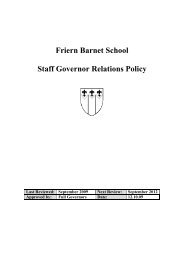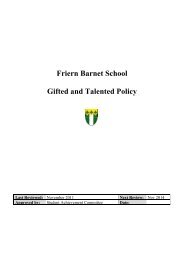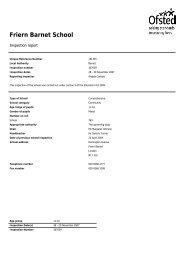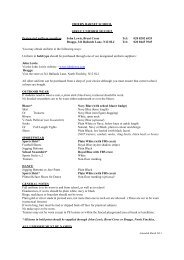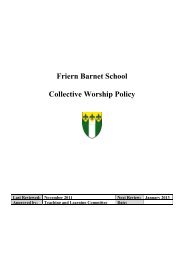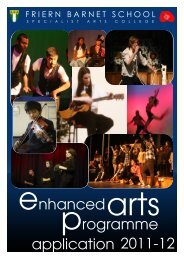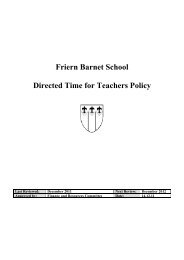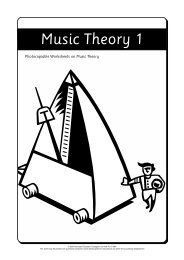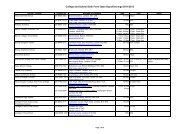Friern Barnet School Sex and Relationships Education Policy
Friern Barnet School Sex and Relationships Education Policy
Friern Barnet School Sex and Relationships Education Policy
You also want an ePaper? Increase the reach of your titles
YUMPU automatically turns print PDFs into web optimized ePapers that Google loves.
<strong>Friern</strong> <strong>Barnet</strong> <strong>School</strong><br />
<strong>Sex</strong> <strong>and</strong> <strong>Relationships</strong> <strong>Education</strong> <strong>Policy</strong><br />
Last Reviewed: June 2010 Next Review: June 2012<br />
Approved By: Teaching <strong>and</strong> learning Committee Date: July 13 th 2010
Rationale<br />
We believe that the sex <strong>and</strong> relationships education programme <strong>and</strong> policy reflects the wide<br />
social, cultural <strong>and</strong> religious natures of our students. The sex <strong>and</strong> relationships education<br />
programme encourages lifelong learning about physical, moral <strong>and</strong> emotional development. It<br />
promotes underst<strong>and</strong>ing of the importance of marriage for family life, stable <strong>and</strong> caring<br />
relationships, respect, love <strong>and</strong> care. It also covers the teaching of sex, sexuality <strong>and</strong> sexual<br />
health.<br />
Aims<br />
At <strong>Friern</strong> <strong>Barnet</strong> <strong>School</strong> we believe that our sex <strong>and</strong> relationships programme is an<br />
educational entitlement for all students. We believe that by carefully considering our<br />
programme <strong>and</strong> its delivery we can play an important part in the development into adulthood<br />
for each of our students. We also believe that parents <strong>and</strong> carers play a vital <strong>and</strong><br />
complimentary role in our aims to:<br />
• encourage personal responsibility in all forms of behaviour<br />
• encourage self esteem <strong>and</strong> respect for self <strong>and</strong> others<br />
• encourage the exploration <strong>and</strong> clarification of attitudes <strong>and</strong> values<br />
• enable the development of interpersonal skills<br />
• enable the development of a moral perspective<br />
• provide accurate <strong>and</strong> appropriate information about how the body works, sexuality,<br />
reproduction, sexually transmitted diseases <strong>and</strong> all aspects of sexual health<br />
• help young people underst<strong>and</strong> the information that is presented <strong>and</strong> the issues of<br />
concern at the time<br />
Practice<br />
Values <strong>and</strong> Beliefs<br />
We will re-enforce our 3 Rs, Respect, Responsibility <strong>and</strong> <strong>Relationships</strong> by encouraging all<br />
students to show:<br />
• respect <strong>and</strong> the valuing of themselves <strong>and</strong> the cultures of others<br />
• underst<strong>and</strong>ing <strong>and</strong> sensitivity towards the needs <strong>and</strong> views of others<br />
• responsibility for their own actions<br />
• responsibility to the school, their family <strong>and</strong> the wider community<br />
• an underst<strong>and</strong>ing <strong>and</strong> demonstration of good relationships<br />
Skills <strong>and</strong> Attitudes<br />
Students will be helped to develop the following skills <strong>and</strong> attitudes:<br />
• good communication<br />
• the ability to make <strong>and</strong> keep good relationships<br />
• appropriate assertiveness<br />
• sensible decision making<br />
• the ability to recognise <strong>and</strong> use opportunities to develop a healthy lifestyle<br />
2
• strength of character <strong>and</strong> ability to resist peer pressure<br />
• a willingness to show openness <strong>and</strong> underst<strong>and</strong>ing<br />
• sensitivity towards the opinions <strong>and</strong> values of others<br />
Organisation<br />
<strong>Sex</strong> <strong>and</strong> relationships education is co-ordinated by the pastoral teams for each year led by<br />
Key Stage <strong>and</strong> Pastoral Support Managers. These teams are responsible for the overall<br />
planning, implementation <strong>and</strong> review of the programme. <strong>School</strong> nurses <strong>and</strong> a range of outside<br />
agencies are involved in helping deliver a range of topics, progressing in content <strong>and</strong><br />
complexity as the students mature in age.<br />
The Delivery of the <strong>Sex</strong> <strong>and</strong> <strong>Relationships</strong> Programme is through:<br />
• themed Lifeskills (extended learning) days (currently each year group has one of these<br />
each year that focuses on sexual development <strong>and</strong> relationships.)<br />
• planned <strong>and</strong> discrete sections of work within Religious <strong>Education</strong><br />
• addressing moral <strong>and</strong> ethical issues which may arise from apparently unrelated topics<br />
in all subjects. (Within this category, as long as any discussions takes place within the<br />
context of the subject, it will not be deemed to be part of the sex <strong>and</strong> relationships<br />
education programme. It will therefore not be subject to the right of withdrawal by<br />
parents or carers.)<br />
Curriculum Content<br />
Key Stage 3<br />
Students will be taught:<br />
• to recognise the physical <strong>and</strong> emotional changes that take place at puberty <strong>and</strong> how to<br />
manage these changes in a positive way<br />
• how to keep healthy <strong>and</strong> what influences health including the media<br />
• that good relationships can promote physical <strong>and</strong> mental health<br />
• about human reproduction, contraception, sexually transmitted infections, HIV <strong>and</strong><br />
high-risk behaviours including early sexual activity, all in a context of the importance<br />
of relationships<br />
• about the nature of friendship <strong>and</strong> how to make <strong>and</strong> keep friends<br />
• the changing nature of, <strong>and</strong> pressure on, relationships with friends <strong>and</strong> family <strong>and</strong><br />
when <strong>and</strong> how to seek help <strong>and</strong> advice if necessary<br />
• about the role <strong>and</strong> importance of marriage in family relationships<br />
• about the role <strong>and</strong> feelings of parents <strong>and</strong> carers <strong>and</strong> the value of family life<br />
Key Stage 4<br />
Students will be taught:<br />
• about the health risks of early sexual activity <strong>and</strong> pregnancy <strong>and</strong> about safer choices<br />
they can make<br />
3
• how different forms of contraception work, all in the context of the importance of<br />
relationships<br />
• where to get advice, in order to inform future choices<br />
• how to talk about relationships <strong>and</strong> feelings<br />
• about the nature <strong>and</strong> relationships of marriage for family life <strong>and</strong> bringing up children<br />
• about the role <strong>and</strong> responsibilities of being a parent, <strong>and</strong> the qualities of good<br />
parenting <strong>and</strong> its value to family life<br />
• about the impact of separation, divorce <strong>and</strong> bereavement on families<br />
• about the statutory <strong>and</strong> voluntary organisations that support relationships in crisis<br />
Teaching Approaches<br />
A variety of approaches are used to give students relevant information, to enable moral issues<br />
to be explored through discussion <strong>and</strong> to acquire appropriate skills. Outside speakers <strong>and</strong><br />
theatre companies may be involved in the delivery of specialist areas. Care is taken when<br />
inviting guest speakers <strong>and</strong> theatre companies into the school. Clear guidance is given as to<br />
the school’s expectations <strong>and</strong> the need to provide a moral <strong>and</strong> non judgmental stance.<br />
Student Groupings<br />
Students are taught in mixed ability <strong>and</strong> gender groups. When there is a specific need,<br />
arrangements will be made to teach students in appropriate groupings. For example, as part of<br />
our KS3 provision some lessons on menstruation will be delivered in separate gender groups.<br />
As with all lessons, students with special needs will be carefully considered.<br />
Staffing<br />
• With regard to sex <strong>and</strong> relationships education it is important that the staff feel<br />
comfortable with the subject matter<br />
• All staff are involved with the tutor system which is seen as being a vital part of their<br />
role in forming positive relationships with students<br />
• Any staff who feel that they may have difficulty in tackling an area of sex <strong>and</strong><br />
relationships education will be treated in confidence <strong>and</strong> with sensitivity<br />
Specific Issues<br />
The following issues may occur <strong>and</strong> staff, students <strong>and</strong> governors need to be aware of the<br />
following procedures.<br />
a) Confidentiality <strong>and</strong> Advice<br />
Students will be made aware that some information cannot be held confidential, <strong>and</strong> will be<br />
helped to underst<strong>and</strong> that if certain disclosures are made certain actions will ensue. At the<br />
same time students will be offered sensitive <strong>and</strong> appropriate support. The following<br />
procedures will be adhered to by all adults.<br />
4
1. Disclosure of pregnancy or advice on contraception –the following procedure will ensure<br />
that students who are in difficulty know that they can talk to an adult in the school <strong>and</strong> that<br />
they will be supported:<br />
• professional information <strong>and</strong> guidance will always be sought from a health<br />
professional.<br />
• the school will always encourage students to talk with their parents first<br />
• students will be asked whether they can tell their parent(s) <strong>and</strong> whether they want help<br />
in doing this. (If this takes place subsequent responsibility then lies with the parent(s).<br />
The family will be offered support from the school if required)<br />
• if students refuse to tell their parent(s) the adult will refer them to a health<br />
professional<br />
• the adult should report the incident to the Headteacher who will consult with the<br />
health professional about informing the parent(s)<br />
• every effort will be made to offer advice <strong>and</strong> support in consideration of the family<br />
<strong>and</strong> student<br />
2. If there is a disclosure or suspicion of possible abuse – the school’s child protection<br />
procedures will be invoked.<br />
b) Family Life<br />
The value of family life is important in the consideration of relationships. This will be<br />
approached through a consideration of the qualities <strong>and</strong> relationships between the different<br />
members in the family. There will be an emphasis on stability, respect, caring <strong>and</strong> support.<br />
As part of the sex <strong>and</strong> relationships education programme issues of contraception,<br />
HIV/AIDS, sexuality <strong>and</strong> abortion are addressed in an appropriate way to each year group.<br />
Facts are always presented in an objective <strong>and</strong> balanced way. Students are encouraged to<br />
consider their attitudes <strong>and</strong> values within an overall moral framework. They will be made<br />
aware of the difference between fact, opinion <strong>and</strong> religious belief <strong>and</strong> given opportunity to<br />
discuss these issues.<br />
c) Complaints Procedure<br />
Any complaints about the sex <strong>and</strong> relationships education programme should be made to the<br />
Headteacher who will follow usual complaints procedures for dealing with complaints<br />
including involving the governing body when appropriate.<br />
d) Parental Partnership<br />
Under the <strong>Education</strong> Act 1993 parents <strong>and</strong> carers have the right to withdraw their children<br />
from all or part of the sex <strong>and</strong> relationships education programme. Parents wishing to<br />
exercise that right are asked to contact the appropriate Key Stage Manager. Once a child has<br />
been withdrawn they cannot take part in later sex <strong>and</strong> relationships education without<br />
parental approval.<br />
5





